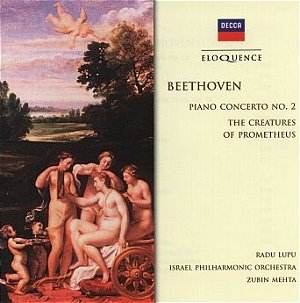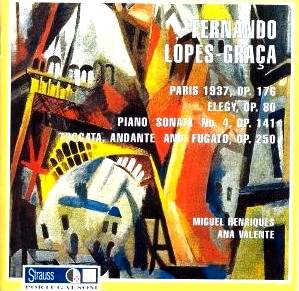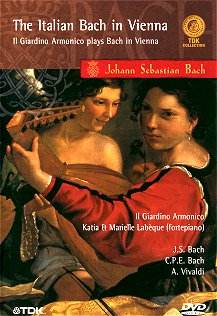 Composer: Ludwig van Beethoven
Composer: Ludwig van Beethoven
Works: Piano Concerto No. 2 in B flat major, Op. 19; The Creatures of Prometheus: Ballet Music, Op. 43
Performers: Radu Lupu (piano); Israel Philharmonic Orchestra, cond. Zubin Mehta
Recording: ADD: recorded 1979 (Concerto) & 1969 (Prometheus)
Label: DECCA ELOQUENCE 466 681-2
Beethoven’s Piano Concerto No. 2, composed in 1792 when the composer was still navigating the transition from the Classical to the burgeoning Romantic style, stands as a testament to his early brilliance. Often overshadowed by its more celebrated successors, this concerto invites a re-examination of its graceful lines and Classical poise. Radu Lupu’s interpretation, recorded with the Israel Philharmonic Orchestra under Zubin Mehta, emerges as a fresh perspective on this work, providing listeners with both historical context and a compelling musical experience.
Lupu’s performance is imbued with a delicacy that respects the concerto’s Classical roots while revealing the expressive depth Beethoven would later explore. His articulation in the first movement is notable, characterized by a clarity that allows the piano’s voice to intertwine with the orchestra rather than dominate it. In the cadenza, Lupu opts for an oddly discursive approach, weaving intricate threads of improvisation that draw attention to the piano’s lyrical capabilities. This choice, while perhaps unconventional, showcases Lupu’s interpretative confidence and invites the listener into an intimate dialogue with the music. Mehta’s conducting, while sometimes heavy-handed during the orchestral tuttis, generally supports Lupu’s nuanced playing, balancing the ensemble’s strength with moments of subtlety.
The engineering quality of this recording, while slightly marred by background noise and the occasional shuffle of the orchestra, nevertheless possesses a warmth and resonance that enhances the listening experience. The recording, made in the late 1970s, showcases a full-bodied sound that captures the vitality of the live performance. Notably, the coupling of the concerto with selections from “The Creatures of Prometheus” ballet music enriches the disc’s appeal. The ballet music, particularly the charming harp interlude in track 10, exemplifies Beethoven’s orchestral ingenuity and serves to highlight the playful aspects of his compositional style.
Lupu’s interpretation does not shy away from the more assertive moments of the concerto. His phrasing in the second movement is particularly ruminative, allowing for an emotional depth that resonates with the listener. While the orchestral playing lacks the refinement expected by contemporary standards, the musicians convey a palpable joy in their performance, suggesting a collective investment in the music. Compared to other notable recordings, such as those by Alfred Brendel or Daniel Barenboim, Lupu’s interpretation may not ascend to the summit of critical acclaim, yet it offers a refreshing, if understated, approach that is both engaging and thoughtful.
This release, part of the Eloquence label’s commendable initiative to reissue Lupu’s 1970s recordings, serves not only as a revival of a significant performance but also as a reminder of Beethoven’s enduring legacy. The warmth of Lupu’s touch, combined with Mehta’s spirited direction, creates a compelling case for the Second Piano Concerto, inviting both aficionados and newcomers to appreciate its subtle charms. The overall package, bolstered by an attractive selection from the Prometheus ballet, represents an essential addition to any Beethoven collection.



